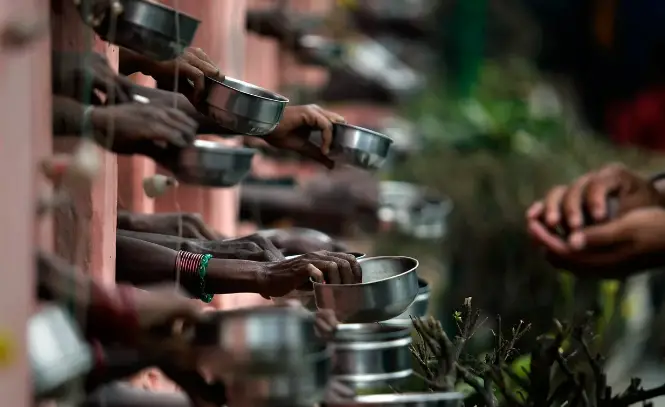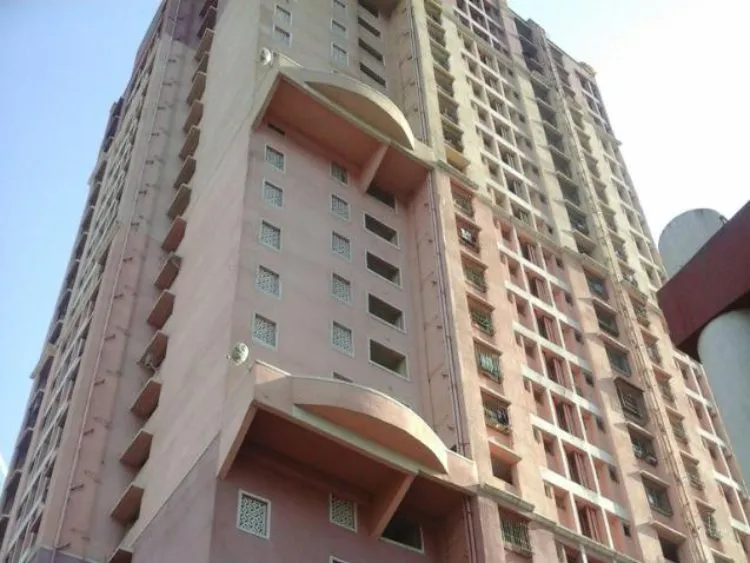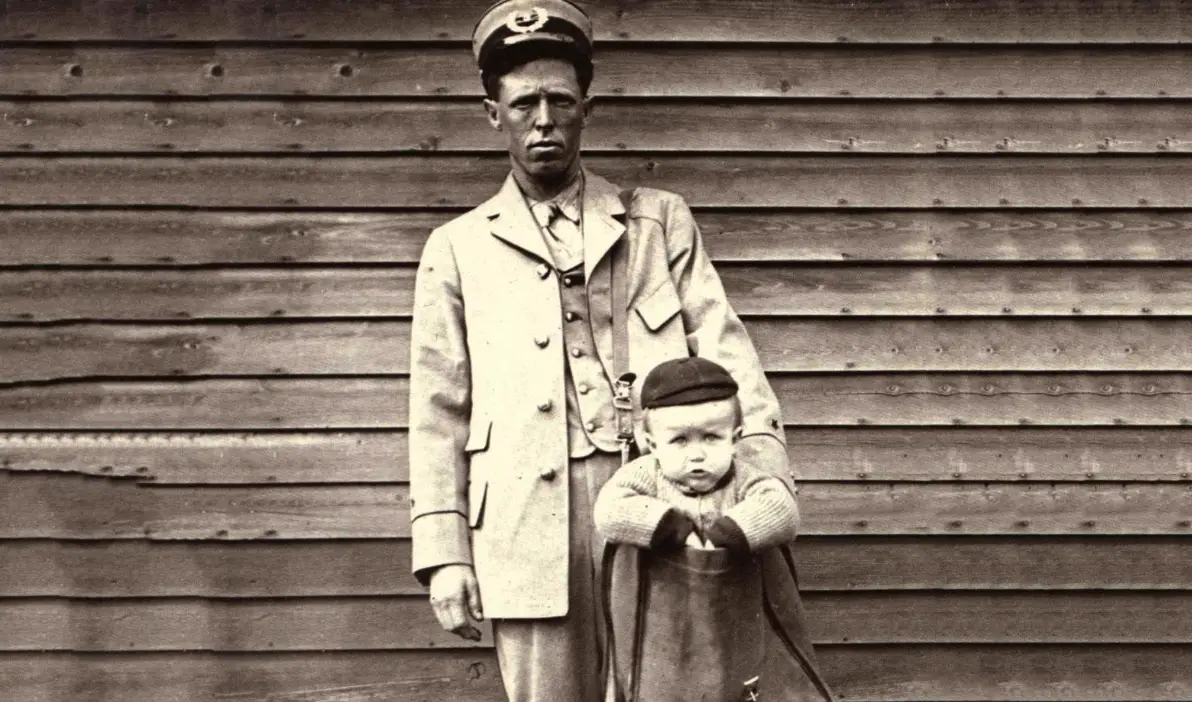World’s Richest Beggar with a Net Worth of Nearly One Million USD

In the bustling heart of Mumbai, a city known for its stark contrasts of wealth and poverty, lives a man who has redefined the very notion of begging.
Bharat Jain, often referred to as the world’s richest beggar, has amassed a net worth of ₹7.5 crore ($1 million) through decades of soliciting alms.
Despite his financial success, Jain continues to beg on the streets, a choice that challenges conventional ideas of poverty and prosperity.
His story, both inspiring and perplexing, offers a glimpse into the complexities of India’s socio-economic landscape.

Early Life and Struggles
Bharat Jain’s journey began in hardship. Growing up in a financially unstable family, he was unable to pursue formal education due to economic constraints.
Begging became his means of survival, a necessity that eventually transformed into a lucrative profession.
Over time, what started as a desperate measure evolved into a career that has allowed him to build a life far beyond the expectations of a typical beggar.
His lack of formal education did not hinder his ability to navigate the streets of Mumbai, where he turned adversity into opportunity.
Daily Life as a Beggar
Every day, Jain can be found at high-traffic locations in Mumbai, such as Chhatrapati Shivaji Maharaj Terminus (CSMT) or Azad Maidan.
He dedicates 10 to 12 hours daily to begging, earning between ₹2,000 and ₹2,500 depending on the location and the kindness of passersby.
His commitment is unwavering, working without breaks or holidays, much like a dedicated professional.
This routine has made him a familiar figure on Mumbai’s streets, where his presence is both a curiosity and a testament to his persistence.

Jain’s approach to begging is strategic. He chooses locations with heavy foot traffic, ensuring maximum exposure to potential donors.
His daily earnings, while modest per transaction, accumulate significantly over time, reflecting the generosity of Mumbai’s residents and visitors.
This disciplined approach has been a cornerstone of his financial success.
Wealth Accumulation
Through his decades-long commitment to begging, Jain has built a substantial fortune.
He owns two flats in Mumbai, collectively worth ₹1.4 crore, and two shops in Thane that generate ₹30,000 per month in rental income.

His total net worth of ₹7.5 crore surpasses the lifetime earnings of many middle-class individuals, highlighting the unexpected financial success of his unconventional career.
This wealth is not solely from begging; his rental income and family business contribute significantly, showcasing his ability to diversify his income streams.
Jain’s real estate investments are particularly notable. Mumbai’s property market is one of the most expensive in the world, and owning two flats in the city is a remarkable achievement.
The shops in Thane, a bustling suburb, provide a steady passive income, further solidifying his financial stability.
His story challenges the stereotype of begging as a last resort, demonstrating a level of financial acumen that rivals that of traditional entrepreneurs.

Family and Education
Jain’s success has also uplifted his family. He lives with his wife, two sons, father, and brother in a 1BHK duplex apartment in Parel, a central Mumbai neighborhood.
Unlike Jain, who was deprived of formal education, his sons have received a quality education at a renowned convent school.
They now assist in the family’s stationery store, which serves as an additional source of income.
This generational shift highlights Jain’s commitment to providing his children with opportunities he never had, breaking the cycle of poverty for his family.
The stationery store, while not as lucrative as his begging or rental income, adds to the family’s financial stability.
It also provides a sense of community engagement, as his sons contribute to the business, blending traditional work with the family’s unique financial journey.
Jain’s ability to balance his begging career with family responsibilities underscores his multifaceted approach to life.
Personal Statements and Charitable Activities
Despite his wealth, Jain has no intention of abandoning his life as a beggar. In an interview, he stated, “I enjoy begging, and I don’t want to give it up.”
He also emphasized his generosity, saying, “I’m not greedy. I’m generous. I donate money to temples and charities.”
His charitable nature is well-documented, as he frequently contributes to religious and social causes, reflecting a sense of gratitude and community spirit.
Jain’s decision to continue begging, despite his family’s disapproval, adds a layer of complexity to his story.
His enjoyment of the activity suggests a deep personal connection to the lifestyle, possibly rooted in the independence and human interaction it provides.
His charitable contributions further challenge the stereotype of beggars as solely self-interested, positioning him as a figure who gives back to society.
| Detail | Information |
|---|---|
| Name | Bharat Jain |
| Title | World’s Richest Beggar |
| Net Worth | ₹7.5 crore ($1 million) |
| Monthly Earnings from Begging | ₹60,000–₹75,000 |
| Daily Earnings from Begging | ₹2,000–₹2,500 (10–12 hours daily) |
| Properties Owned | Two flats in Mumbai (₹1.4 crore), two shops in Thane (₹30,000/month rent) |
| Family | Wife, two sons, father, brother |
| Residence | 1BHK duplex in Parel, Mumbai |
| Family Business | Stationery store |
| Charitable Activities | Donates to temples and charities |
| Begging Locations | Chhatrapati Shivaji Terminus, Azad Maidan |
Broader Context
Bharat Jain’s story is part of a larger phenomenon in India, where begging has evolved into a significant industry.
According to the 2011 Census, there were approximately 413,670 beggars and vagrants in India, with West Bengal having the highest number at around 75,000.
However, some estimates suggest the total number of beggars could be as high as 400,000, with cities like Mumbai and Delhi reporting figures between 60,000 to 80,000 and 2,000 to 60,000, respectively.
The begging industry in India is reportedly worth around $1.5 billion, with an average beggar earning up to ₹24,000 per month.
A 2008 study by Hyderabad-based sociologist Mohammed Rafiuddin estimated the industry’s value at ₹180 crore ($1.8 billion), with beggars spending 20% on food, 30% on habits like smoking or drinking, and 50% on savings.

This industry is often organized, with syndicates managing groups of beggars and distributing earnings.
Beyond individual beggars, the industry involves exploitation, particularly of children.
It’s estimated that up to 40,000 children are abducted annually and forced into begging, contributing to a multi-million-dollar industry controlled by human trafficking cartels.
In Mumbai, police have noted that some parents push their children into begging, exploiting government education programs while keeping children on the streets.
Despite legal prohibitions in several cities, including Delhi, where begging is illegal under a 55-year-old law, the practice persists due to socio-economic challenges and the lack of effective rehabilitation programs.
Other notable beggars, such as Sambhaji Kale with a net worth of ₹1.5 crore and Laxmi Das with ₹1 crore, further illustrate the potential for wealth accumulation within this industry.
Jain’s story is not just about wealth but about resilience, family, and the human spirit’s ability to adapt and thrive in the most unlikely circumstances.
In a country where begging is both a survival mechanism and a complex industry, Jain’s success highlights the need for a deeper understanding of the socio-economic forces at play.


































